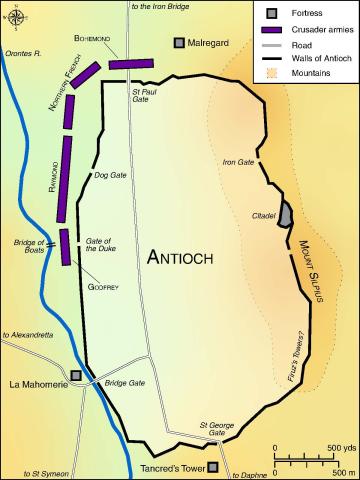The Capture of Antioch
[8.19.1] Iamiam omnēs sēmitae paene prohibitae et incīsae undique erant Turcis, nisi ex illā parte flūminis ubi erat castrum et quoddam monastērium. Quod castrum sī fuisset ā nōbīs perfectē mūnītum, iam nūllus eōrum audēret extrā cīvitātis portam exīre. Conciliāvērunt sē dēnique nostrī, et ūnā vōce concorditer dīxērunt: “Ēligāmus ūnum ex nōbīs, quī rōbustē teneat illud castrum, et nostrīs inimīcīs prohibeat montanēās et plāna, et introitum urbis ac exitum.” Tancredus igitur prīmus prōtulit sē ante aliōs dīcēns: “Sī scīrem quid prōficuī mihi attigerit, ego sēdulē cum meīs sōlummodo hominibus corrōborārem castrum, et viam, per quam inimīcī nostrī solent frequentius saevīre, virīliter dēvetābō illīs.” Quī continuō spopondērunt eī quater centum marcās argentī.
notes
(March–April 1098) The crusaders have blockaded all the city gates except one (St. George's Gate). There was a fort there and if they could hold it they would keep the Turks from using that gate to attack the crusaders. The crusader leaders meet to choose someone to do hold the fort, and Tancred volunteers, after being promised a suitable reward.
Turcīs: dative of disadvantage; the paths were blocked for the Turks.
quoddam monastērium: the monastery of St. George, on a hill above St. George’s Gate.
plana: = plana loca.
Sī scīrem ... , ego ... corrōborārem castrumscīrem: The condition is framed as present contrary fact condition (impf. subj. in protasis and apodosis), but the reference in fact is to future time.
quid prōficuī mihi attigerit: “what of profit would come to me.” prōficuī is the partitive genitive.
Quī continuō spopondērunt eī: “who (the Franks who met in council) promised to him (Tancred).”
quater centum marcās argentī: It is always difficult to know the purchasing power of a medieval sum of money. One suggestion is that 400 marks would have bought 30 of the very best warhorses.
vocabulary
iamiam: and now indeed (emphasizing that an action is imminent; see OLD iam 5)
sēmita –ae, f: path, track
incīdō incīdere incīdī incīsum: to interrupt; block (ML)
conciliō (1): to bring together, unite (OLD 1)
robuste: firmly
prōferō prōferre prōtulī prōlātum: to put forward, bring before others (OLD 6)
proficuum –iī, n.: profit (ML)
attingō attingere attigī attactum: to touch (CL); to come to (ML)
sēdulē: carefully
sōlummodo: only (LL)
cōrroborō (1): to strengthen, fortify
saeviō saevīre saeviī saevītum: to behave ferociously, rage
dēvetō (1): to deny completely, to keep someone (dat.) from using something (acc.) (ML)
spondeō spondēre spopondī sponsum: to promise


